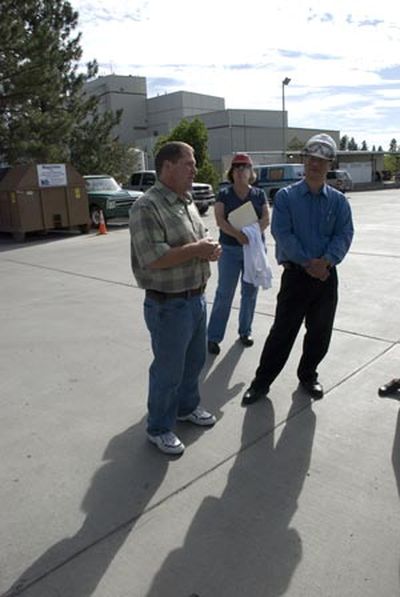Geoff Glenn, garbage expert

Whenever Geoffrey Glenn ponders the future of Spokane, he envisions a community where his grandchildren will someday breathe clean air, drink safe water, eat produce grown in healthy soil.
It also would be a community where his grandchildren and others understand that their simple, everyday acts can have a lasting impact – not just on their families and those around them, but also on the planet and on people and ecosystems spread out across the world.
The goal of Glenn, hazardous waste coordinator for the city’s Solid Waste Management, is to encourage the citizens of Spokane – particularly youth – to embrace sustainability in order to alleviate global crises such as climate change and the depletion of energy resources as well as reduce their impact on the planet.
“I want my future grandchildren to make connections,” he said. “I want them to see that there is a direct relationship between the environment and the way humans behave – from the things they buy to how they vote to how they get themselves to work every morning.”
His vision for sustainability has led Glenn to bring together three community institutions – city government, local K-12 schools and higher education – to design a project that ultimately will promote education, environment and the economy.
As a city employee and manager, Glenn wants to ensure that the city’s Solid Waste Management engages in a department-wide effort to reduce fuel use and carbon emissions.
As the parent of five children and a citizen of Spokane for the last 26 years, Glenn also hopes to change people’s attitudes about waste and to encourage sustainable methods to control and reduce the amount of garbage generated in the area. He envisions a solution in which SWM will lead the efforts to encourage zero-waste production by educating the public about alternatives to recycling. Instead of simply persuading people to buy and use recycled goods, Glenn’s approach is to curb the tendency to create garbage in the first place.
Glenn’s awareness of environmental issues began when he was a child growing up in the urban density and smog of Los Angeles. His perspective also was shaped by the 1976 accident at Pennsylvania’s Three Mile Island, followed by the Chernobyl disaster seven years later.
Glenn’s background as a hazardous waste technician and his work with various entities including the Washington State Department of Health and the Environmental Protection Agency also led him to conclude that instead of seeking a remedy to preserve our fragile environment, most municipalities turn to Band-Aid approaches when solving problems related to waste.
By becoming involved in this joint venture among the City of Spokane’s Solid Waste Management, higher education and K-12 schools, Glenn hopes to work toward a lasting solution to garbage. He and others see this project as a way to stimulate young people to learn about sustainability plus change outlooks and behaviors for the preservation of the planet.
For the past year, Glenn has worked with professors at Gonzaga University as well as future teachers enrolled in the university’s Master of Initial Teaching program. The GU students have assisted Glenn in the collection of data pertaining to garbage and other sustainability issues in the community.
Their work with the City of Spokane is closely tied to their graduate research projects as well as the lesson plans they have created for students. The hope is that these educators, who serve as local student teachers, will influence youth as they shape their attitudes and behaviors surrounding environmentalism, economic issues and waste management.
“I see myself as a facilitator of a new dawn in Solid Waste,” said Glenn, who led a 2008 study of his department’s culture, practices and attitudes before embarking on the joint project.
In addition to developing an environmental curriculum for students in kindergarten through grade 12 as well as offering hands-on opportunities for youth to learn about Spokane’s efforts to reduce and prevent waste, this project also provides a case study – a model of collaboration that can easily be adapted to fit the needs of other municipalities and communities.
“As I’ve matured in my understanding of environmental impact, it’s hard to separate behaviors from what happens to the planet,” he said. “This (project) is the next logical, intellectual and spiritual step in this industry.
“It’s time to think outside the box and consider the global community.”
Besides promoting the concept of “zero-waste,” Geoff Glenn wants other communities to learn from Spokane’s experience. As the hazardous waste coordinator for the city’s Solid Waste Management, Glenn led a study last year that explored Solid Waste’s culture and practices.
He will share his expertise and the study’s findings this June at the Solid Waste Association of North America’s 14th annual Landfill Symposium and Planning & Management Conference. Hundreds of people are expected to attend the event in Savannah, Ga. His presentation is titled, “A Case Study in Organizational Culture.”